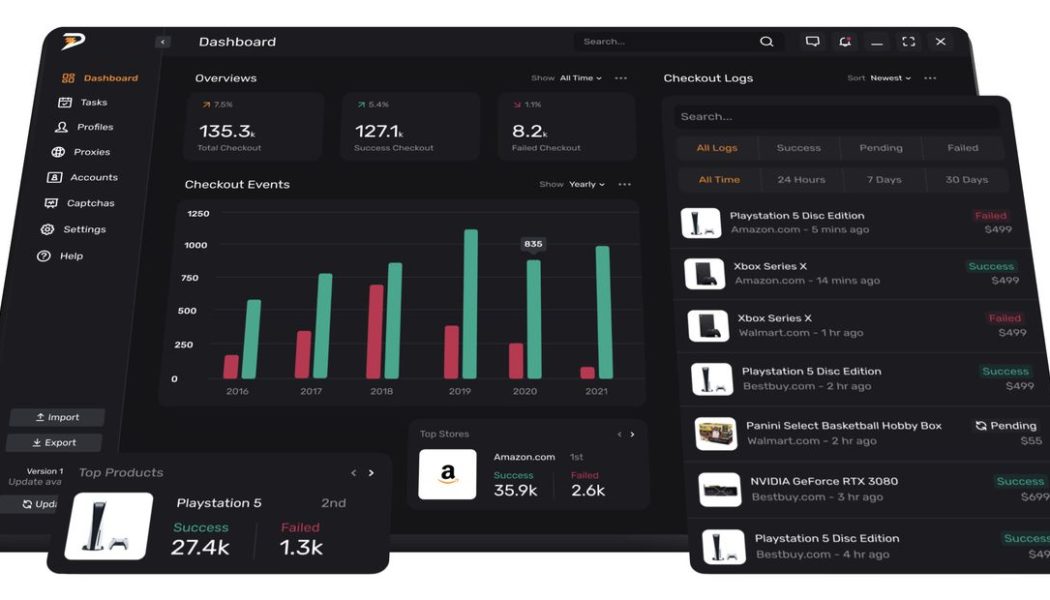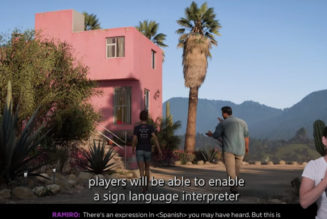More than a year on, it’s still hard to buy a new PlayStation or Xbox without some help. Flippers have become notorious for snatching up the fresh restocks offered online with the help of ultra-fast buying bots, forcing everyone else to buy units off the secondary market for egregious, 100-dollar markups. But after delving into the console reselling underworld, I was shocked to learn that resellers aren’t the primary problem. Instead, they’re merely the pawns of the true powerbrokers of the industry: the enterprising developers selling these bots to aspiring flippers in the first place.
Dozens of what are known as “AIO resale bots” have popped up in recent years, offering prospective flippers an “all-in-one” service that can snatch up tons of sneakers, graphic cards, and consoles in order to power their own black market businesses. They offer a suite of tools that allow users to pass through the digital checkout infrastructure of retailers like Walmart and Best Buy in an instant with a heavy load of plunder in tow. Most of these bots are saddled with an upfront payment and a recurring usage fee, which means they’re simply the middlemen for the scalping industry writ large. The programmers all believe that they’re fighting the good fight; after all, what’s more American than supply and demand?
“Financial freedom is something the United States and all countries stand for. We’re all aiming for it in the end, not just resellers but consumers,” says Fuat, a German entrepreneur who is one of the partners behind the buying bot Dakoza, in a Discord call with The Verge. (He only shared his first name for the story.) “We have users DMing us saying, ‘Thank you so much for this opportunity. I was able to afford my wedding. I was able to buy clothing for my baby.’ The impact we have on people is not negative; it’s definitely positive. This software lets them change their lives.”
Dakoza’s pitch is simple. For an initial $300 fee and monthly $50 payments afterward, the bot lets its users morph their computers into an unparalleled price-gouging force of nature. In a demonstration of Dakoza’s UI plastered across its homepage, we see a trickle of receipts for Xbox Series X consoles, PS5s, and Nvidia graphics cards leak into a shark’s inventory like clockwork. The service is optimized for Target, Best Buy, Amazon, and Walmart.
The Twitter account “Dakoza Success” proudly promotes all of the bounties scored by the bot’s users. In one memorable post, one lucky rounder shows off nine freshly purchased GeForce RTX 3080s stacked to the ceiling like LEGO bricks. It’s an image that evokes an enfeebling combination of envy and rage, as it becomes increasingly clear that the botters are perpetually one step ahead of our mere keyboards and mouses.
Fuat, like the two other partners involved in Dakoza, stumbled into the resale industry through the dark art of sneaker flipping. Enthusiasts and scalpers routinely queue for hours outside of flagship Nike stores so they may secure a hot pair of LeBrons before the price tag quintuples on the open market. “[A friend] asked me to go to a store and buy a pair of shoes so he could hand them to a client. He gave me $50 for it,” says Fuat, detailing his own origin story. “He explained the whole scene to me.”
:no_upscale()/cdn.vox-cdn.com/uploads/chorus_asset/file/23582760/dakoza.jpg)
This was during the height of the pandemic when Fuat was stuck at home, plugging away at his day job in IT, looking for any sort of distraction. Few people possess the vocational expertise to capitalize on a notable inefficiency in the resale market, and with just a few lines of code, Fuat understood that he could effectively function as a middleman — funneling merchandise directly to the grinders in the streets.
“I noticed that a lot of people who run this scene, or have businesses in the scene, are in IT,” he says. “I was like, ‘Man, this community is super talented. There must be an opportunity here.’”
Botting has been a fixture in reselling for a good five years, but the combination of Covid boredom, mogul dreams, and overwhelming mainstream intrigue brought a generation of amateur hustlers into the flipping ecosystem, says Anton, another German who co-founded Dakoza and declined to give his full name for the story. His case bears truth in the data. According to CNBC, Americans are purchasing more from scalpers than ever before.
There is likely all sorts of abstruse chicanery happening on a checkout bot’s backend, and I was not surprised that my sources didn’t want to go into detail on how their apps worked. But the owner of Hayha, another popular resale service, broke down the programming basics for me in a message sent over Discord chat. “When your browser checks out an item on a retail site, it sends ‘requests’ to the site’s server. These requests are basically commands that tell the server what to do. Add this item to the cart, submit my order, and so on,” they wrote. “We send those commands associated with checking out to the servers of sites we automate without requiring a browser. Basically, we can mimic what a human does, stripping out the unnecessary lags and delays of a browser.”
“It’s nothing really tricky,” adds Anton. “We just mirror what the user would do.”
Of course, Anton notes that the Dakoza membership experience offers more than just a devious bit of code. Like other botting cartels, the company employs a crack team of human moderators to constantly keep subscribers informed on incoming retail restocks so that they’re ready to pounce at the exact moment Target rolls out a new suite of consoles. “We’re basically able to tell people when they should run [Dakoza,]” he adds.
There are a shocking number of resale platforms offering the exact same promise as Dakoza. I reached out to about 10 while writing this story and began to run into some strange recursive quirks. All of the websites for these platforms look suspiciously similar, right down to the interface and graphic design. Can you detect a discernible aesthetic difference between, say, Trickle and Viper, two popular bots in the scene? Anton tells me that this is simply a coincidence. “New software products always have a default design,” he says.
:no_upscale()/cdn.vox-cdn.com/uploads/chorus_asset/file/23582687/tricle.png)
:no_upscale()/cdn.vox-cdn.com/uploads/chorus_asset/file/23582688/viper.png)
What’s more bizarre is that nobody can buy Dakoza right now — or most of the other bots on the market. Any prospective flipper must instead linger on a waiting list for an indefinite amount of time before finally being offered the chance to license the software. This is remarkably common across the entire scene. In fact, I didn’t encounter a single botting company that allowed me to purchase their automation service off the rack without first signing up for an interminable queue. Just like the sneakers and game consoles they’re designed to buy, these apps are offered only in a limited supply to a lucky few buyers.
It’s a strategy that doesn’t add up economically. Wouldn’t Dakoza make a ton more money by broadening out their subscription apparatus to anyone interested in the scalping lifestyle? But Anton tells me he wants to keep numbers small in order to ensure that the company can meet the bespoke needs of all of its customers. The limited number of members, he argues, all add up to a better user experience. “With limiting access to the bots it makes it easier to run everything without cutting into profits,” he says. “There’s less troubleshooting and software handling. We have a weekly Twitch stream where one of our moderators answers questions live.”
Manufactured scarcity is crucial to a bot’s notoriety, says a person who knows the sneaker industry and asked to remain anonymous for employment concerns. It lets us imagine the sea of PS5s that could be ours, if only we could breach through that locked door. “Creating FOMO is part of the business plan,” the person says.
This sentiment was echoed by Matthew Milic, an 18-year-old in Canada and dedicated flipper who says he’s scooped up huge quantities of PS5s. Milic believes that the idea that anyone can purchase a piece of automation software and immediately rake in massive revenue is a fantasy. This scene has become saturated with questionable upstart companies, and most of them, he says, are overpromising what their software can do.
“There’s maybe only two or three bots that perform well on a consistent basis. Then all the other bots are just a waste of money,” Milic says. “Those are for new people who don’t know the industry. They’re like, ‘Oh, this bot is only $500,’ and they’ll buy it up and it’ll get them nothing.” (For what it’s worth, Milic says that he doesn’t know much about Dakoza or the quality of its product.)
The Hayha founder tells me that his user base doesn’t just include resellers. They claim to have plenty of casual collectors in the mix who “feel frustrated trying to check out manually on these sites” and simply want an Xbox to call their own. Never mind the fact that the “frustration” he refers to can be blamed solely on the secondhand market that companies like Hayha are making more predatory by the day; nobody wants to see themselves as the villain.
In fact, the bot programmers pitch themselves as the arbiters of a beguiling new techno-yeoman fantasy: for just $50 a month, maybe you too can pull yourselves up from the grey muck of stagnant employment with the power of ludicrously expensive eBay listings.
“Instead of going to McDonald’s for $13 an hour, they’re trying to [make it] themselves,” says Fout, on Dakoza’s users. “They’re trying to buy a pair of Yeezys and make $200.”
He is not wrong, which is the scary thing. In this precarious economy, beset by mounting inflation and a structural breakdown of the very contours of full-time work, people would rather flip video game consoles than work a job with no agency or absolution on the horizon. The bot makers and the scalpers are both cogs in the same machine — a mad scramble for any leverageable commodity, as side hustles become a survival requirement, rather than, you know, a hobby.
Perhaps someday the supply chain will snap back into order and there’ll be too many consoles to scoop up. Until then, I’ll be refreshing the Best Buy homepage, hoping to finally edge out the machines.









